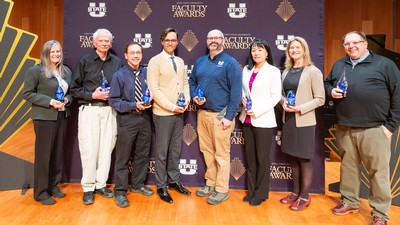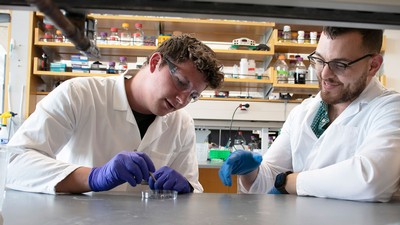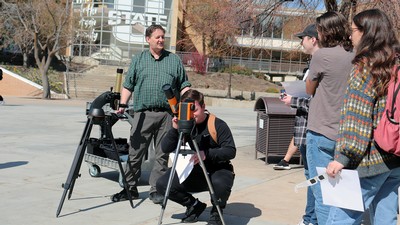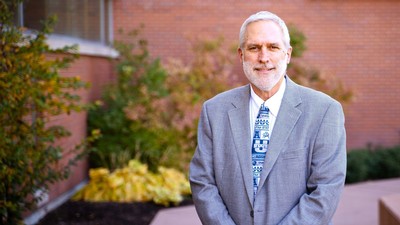USU Undergrad Awarded Prestigious National Research Fellowship
With a variety of equipment salvaged by his thrifty faculty mentor, Utah State University physics student Ben Pound is conducting a breakthrough research project using carbon nanotubes.
“We’re working to develop a biological sensor that can detect a variety of molecules, specifically proteins, in a solution,” says Pound, an undergraduate researcher in the Nanoelectronics Laboratory of Physics professor T-C Shen.
The Kaysville, Utah, native’s research efforts impressed the selection committee of the National Institute of Standards and Technology Summer Undergraduate Research Fellowship program, which invited Pound to join its 2014 summer cohort. Pound is one of about 100 undergrads selected nationally to participate in the 11-week, Washington D.C.-area program, which includes a $5,500 stipend.
“NIST allows us to put forward only one applicant from USU each year,” says Scott Bates, associate vice president of USU’s Undergraduate Research program. “It’s a very competitive program, so Ben’s selection is a very prestigious honor.”
Pounded travels to his internship post in May, with wife, Erika Zimmerman Pound, a USU sociology major.
“We’ve never been to D.C. before, so this will be a great adventure,” says Pound, who graduated from Davis High School in 2009. “We’re very grateful to Dr. Bates, Dr. Shen and sponsored programs administrator Kellie Hedin for helping me navigate the application process.”
Pound’s current research is funded by a USU Undergraduate Research and Creative Opportunities — URCO — grant awarded in fall 2013.
“Our approach toward making a biological sensor using carbon nanotubes is aimed at detecting pathogens at much lower concentrations and lower cost,” says Pound, an Undergraduate Research Fellow, Honors student and Presidential Scholar.
In this course of this research, Pound has also been investigating the use of carbon nanotubes as field emitters, which are used in applications varying from electron microscopes to displays. By shaping a carbon nanotube forest a certain way, he says, carbon nanotubes can be made into field emitters.
“Carbon nanotubes are a great material to use as field emitters,” Pound says. “They can operate at low temperatures and low voltages, both of which are in demand for today’s applications.”
During his NIST internship, Pound will be involved in theoretical modeling research.
“It’s an amazing opportunity,” he says. “I’m looking forward to working in a national lab and meeting NIST scientists.”
Related links:
USU undergraduate physicist Ben Pound has been awarded a National Institute of Standards and Technology Summer Undergraduate Research Fellowship. He travels to the Washington, D.C., area this summer for an 11-week internship.
Undergraduate Research Fellow Ben Pound, right, with faculty mentor, T-C Shen, professor in USU's Department of Physics.
TOPICS
Awards 691stories Undergraduate Research 156stories Physics 99stories Internship 47storiesComments and questions regarding this article may be directed to the contact person listed on this page.







